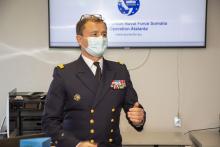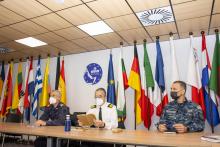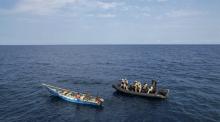In accordance with the Operation Commander’s guidance, the Vice Admiral José M. Núñez, his current deputy, the Rear Admiral Emmanuel Slaars, presented his first orientations to Rear Admiral Fabrizio Bondi and his staff, prior to their commitment in the Operation Atalanta by mid-March, on board the Italian frigate ITS Bergamini.
R. Adm Slaars’ initial remarks were devoted to the professionalism, team spirit and excellent working environment at the Operational Headquarter, besides his expression of gratitude to all staff members, who have made his arrival and hand-over in January, smooth and simple.
He then named four capabilities of Operation ATALANTA, which must be cherished, the Operation being in an ever changing security environment.
“The Operation is committed to uphold international law. We are the textbook example of what a combined joint operation can achieve in line with the rules based order that we, as Europeans, have been always attached to”. He highlighted his willingness to continue the EU integrated approach to this kind of crisis.
He considers the real-time monitoring of the maritime IRTC (International Recommended Transport Corridor) in the Gulf of Aden, a key stone for the success of ATALANTA. This sensitive task relies notably on the permanent links that ATALANTA has both with maritime operators and ships at sea level, secondly the Maritime Security Centre that ATALANTA has in Brest, and finally the implementation of the smart tools developed by the European Maritime Safety Agency based in Lisbon, an agency with which ATALANTA holds a strategic cooperation agreement. This depicts a real example on how the cooperation among agencies and bodies within the EU proves their worth.
Another of the Operation’s key strength is its mutual reinforcing ties with the shipping industry, based on the constant knowledge exchange, cooperation in the maritime security domain, and the regular conference organised to share appreciations on security at sea in the area. The partnership between ATALANTA and the Shipping Industry has been not only maintained but also enhanced, based on a never seen before mutual trust.
The last treasure the Deputy Commander pointed out is the compositions of the staffs, ashore and afloat, as a shining example of the common European effort and commitment with maritime security in the aero-maritime domain in the Horn of Africa.
The second part of this speech revolved around the perfect dialogue in place with the current Force Commander, Portuguese Commodore Joao Pereira, operating from Spanish frigate SPS Victoria. The geostrategic context in the Indo Pacific was discussed, as well as to what extent the participation of French navy assets will be congruent with the recent activation of the Counter-Narcotic Operation as an ATALANTA secondary executive task.
“Along with our core responsibilities with regards to counter piracy operations, and the protection of United Nations World Food Program, the implementation of this secondary executive task will broaden ATALANTA involvement in maritime security in the North-Western Indian Ocean. By doing so, we will keep on demonstrating that ATALANTA is an efficient tool to further contribute to build a maritime security architecture in the area.”



